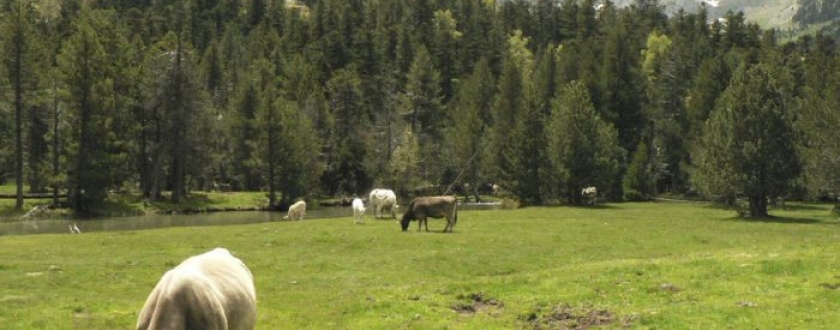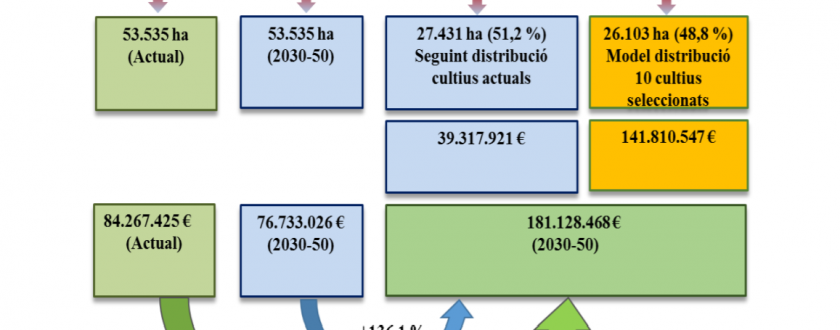Study on climate change adaptation in the agricultural sector of the Alt Pireneu and Aran
Description of the case study
The study titled Climate Change Adaptation in the Agricultural Sector of the Alt Pireneu and Aran: Risks and Opportunities uses a climate-based model of crop cultivation to compare the current situation against a future scenario (2030--2050).
Agriculture sector income in the Alt Pirineu and Aran is valued at €84.3M with an 8.9% (€76.7M) reduction forecast for the 2030-2050 period. This negative impact caused by future climate conditions must be the driver to push for a particularly major change in large areas of dry farmland as they have less margin for manoeuvring when it comes to diversifying the crops that they provide irrigation for. On dry farmland, Mediterranean crops and some fruit trees that require little water will be the most favourable. On the other hand, other traditional Pyrenean dry farmland crops such as potato will suffer major setbacks.
Climate change may be the solution that ignites a fundamental transformation of the current agriculture economy that is characterised by certain crops meant for feeding livestock.
The objectives of the study are:
» Obtaining a summary snapshot of the Alt Pirineu and Aran agricultural sector, and its current economic potential. Identifying the soils that are most agriculturally ideal.
» Detecting the main impacts of climate change on Pyrenean agriculture.
» Determining the crops susceptible to being recovered or maintained in the Alt Pirineu and Aran regions, and new opportunities that climate change offers.
» Estimating the total agricultural production, and the market value in different production scenarios, as well as the repercussions on employment rates (the possibility of keeping populations in the region).
The study proposes that the fundamental transformation of the current agrarian economy is based on the increase of extensive shepherding in alpine meadows and non-agricultural valley areas as a guarantee for easing pressure on agricultural soil, and reverting the trend of afforestation and the associated loss of biodiversity.
With this extensive shepherding intensification proposal, 26,103 hectares of agricultural surface area could be freed up for human food production with high economic performance and minimal water consumption. The agricultural sector’s gross income in the future could reach €181.1M (78.3% corresponding to 10 crops meant for human consumption) instead of the current €84.3M or €76.7M forecast for the same 2030-2050 scenario.
Case study developed and implemented as a climate change adaptation measure.
Commissioned by the Catalan Climate Change Office and carried out by l’Espigall.
Additional Information
The Catalan Climate Change Office, Catalonia Meteorological Service, Life Medacc Project (LIFE ENV/ES/000536 Demonstration and validation of innovative methodology for regional climate change adaptation in the Mediterranean area), CREAF, IPE (CSIC), IRTA.
There are some difficulties, such as the management required for livestock extensification, through access to vineyard planting rights, the lack of agrarian workers or infrastructure to support this diversification, or the need to modernise irrigation to adapt it to modern agriculture that is more efficient in its use of water.
The study indicates that the production loss that climate change will cause can be largely overcome thanks to a focus on crops for human consumption (that, on the other hand, would increase food sovereignty in the field) and optimising dry farmland and irrigation areas.
An economic evaluation is provided that estimates that the agricultural sector’s gross income in the future could reach €181.1M (78.3% corresponding to 10 crops meant for human consumption) instead of the current €84.3M or €76.7M forecast for the same 2030-2050 scenario.
This study falls within the framework of the Life Medacc Project (LIFE ENV/ES/000536 Demonstration and validation of innovative methodology for regional climate change adaptation in the Mediterranean area), promoted by the Catalan Climate Change Office, the CREAF, the IPE (CSIC), and the IRTA.
Likewise, it should be noted that this study is being developed by taking into account Catalonia’s general climate change adaptation framework: The 2013-2020 Catalan Climate Change Adaptation Strategy, which encourages understanding the impacts of climate change in the Catalan Pyrenees region.
01/01/2017 - 12/31/2017 (1 year - completed)
Reference information
PYRENEAN CLIMATE CHANGE OBSERVATORY
Avenida Nuestra Señora de la Victoria, 8
22.700 - Jaca
Huesca - España
+34 974 36 31 00
info_opcc@ctp.org







